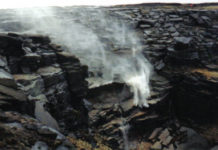Mythical creatures especially lake monsters have known to have existed only in Fairy Tales and legendary tales of the past. Well, America has the Big Foot, Nepal has the Abominable Snowman and apparently Iceland has a Giant Worm Monster called lagarfljót worm. Iceland’s most famous lake monster is declared a reality by Icelandic government investigation. An Icelandic government investigation has ruled that Lagarfljótsormur, the country’s most celebrated legendary sea serpent, actually exists. The Lagarfljótsormur or ‘LagarfljótWorm’ is purported to live in Lagarfljót, a freshwater, glacial-fed lake in Egilsstaðir, eastern Iceland.
The earliest recorded sightings date back to the Icelandic Annals of 1345. The monster is typically described as being 300ft (90m) long with many humps, and has also been reported outside the water, lying coiled up or slithering into the trees. In ancient times, sightings were thought to augur a great event such as a natural disaster.
..the snake had grown so large that the chest was beginning to come apart
In their book Icelandic Folk and FairyTales, folklorists May and Hallberg Hallmundsson describe one origin tale of the beast: long, long ago, a woman who lived on a farm in the Lagarfljót district, near a stream where it broadened into the lake, gave a gold ring to her daughter, instructing her to catch a ‘lingworm’ (heath dragon) and put the ring underneath it in her linen chest. She did so, “but when the girl went to look at her ring again, the snake had grown so large that the chest was beginning to come apart. Then the girl was frightened and she picked up the chest with everything in it and threw it into the lake.
Also Read: The Loch Ness Monster Legacy
A long time passed, and gradually people became aware that there was a serpent in the lake, for it was beginning to kill both people and animals crossing the waters. ”Two Finns called in to destroy it and retrieve the gold said that they’d tied its head and tail to the bottom of the lake but couldn’t kill it because there was a still larger ‘dragon’ underneath.
A FARMER WHO SHOT THE video shows the long serpentine form of the Worm swimming in snow-covered, icy water.
In 1963, the head of the Icelandic National Forest Service, Sigurður Blöndal, reported seeing the giant worm, and in 1998, a teacher and students at Hallormsstaðir School also claimed a sighting. In February 2012, the Icelandic national broadcaster, RÚV, aired a video shot by Hjörtur E Kjerúlf, thought to show the long serpentine form of the Worm swimming in snow-covered, icy water. This was widely viewed on YouTube. Check out the famous Iceland Worm Monster video.
Sceptics dismissed it as an inanimate object agitated by the rapid current – possibly an ice-caked fishing net or a piece of cloth caught on a branch. Kjerúlf states that he first noticed the thing while drinking coffee, and that it was still there when he finished, presumably some minutes later, indicating that it hadn’t moved (or moved very little) during that time. It also hadn’t moved in the time it took him to find his camera, go out to the bank, and videotape it (from two different angles). Kjerúlf never claimed he had filmed the Lagarfljót Worm; he left its identification to others.
the Fljótsdalshérað municipal council declared the video authentic and recommends further investigation.
The Fljótsdalshérað municipal council set up a 13-person ‘truth commission’ to determine whether the video was the real deal. The inquiry has just completed its investigation. Declaring the video authentic, it recommends further investigation and research. Sceptics won’t be slow to point out that the commission’s conclusion may well have been influenced by the dramatic rise in cryptozoological tourism in the wake of the 2012 video.
A sightseeing boat named Lagarfljótsormurinn, operating on the lake, seeks to preserve the traditions of the Worm. Even if the video does indeed show a living creature, it may not be as monstrous as the legends say. Species of fish have been found which resemble sea monsters’; for example the frilled shark (Chlamydoselachus anguineus) and the giant oarfish (Regalecus glesne).
These two species that closely resemble mythological monsters are still alive and commonly spotted.


Whatever the truth, more scientific investigations are needed to be conducted to remove any slightest of doubts about the Iceland Worm Monster’s existence.
-end-

Sources & References:
- Discovery News, Sept; Ancient-origins.net, 14 Sept 2014



































